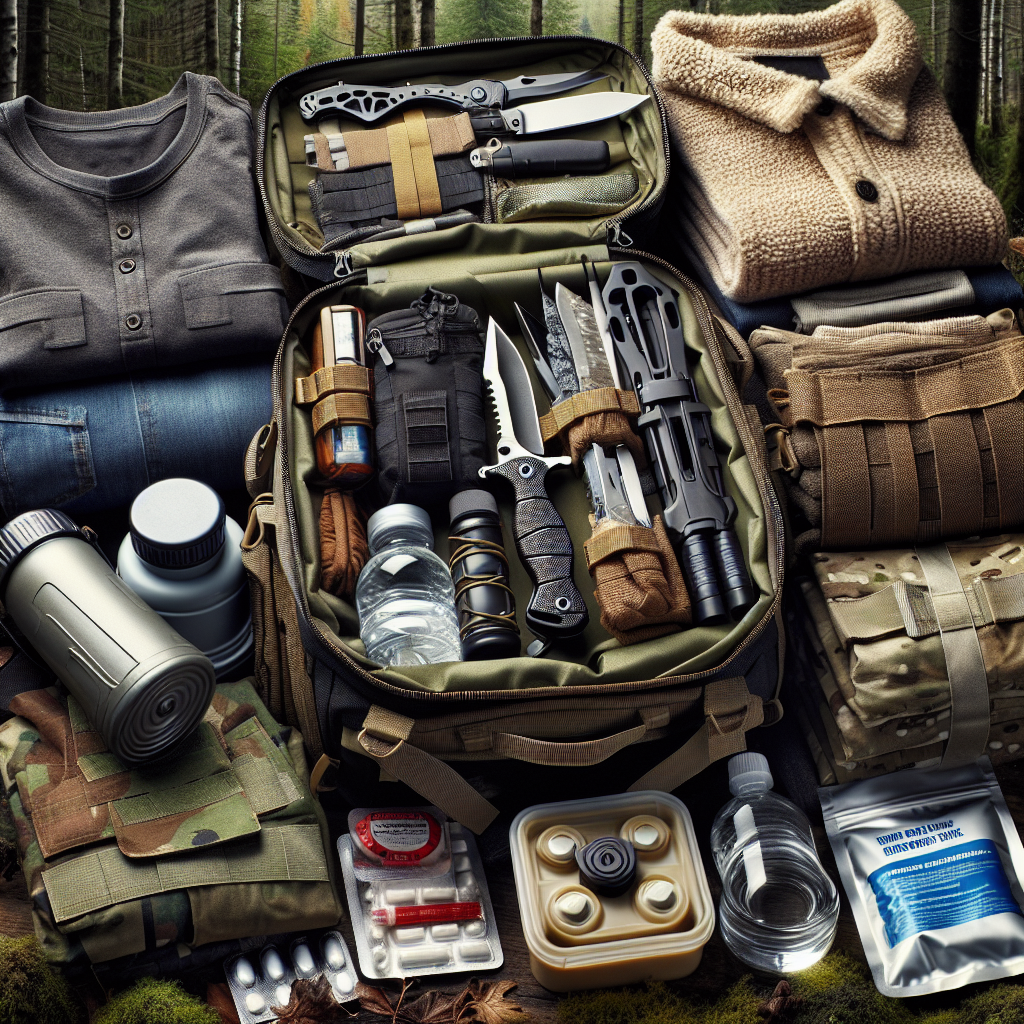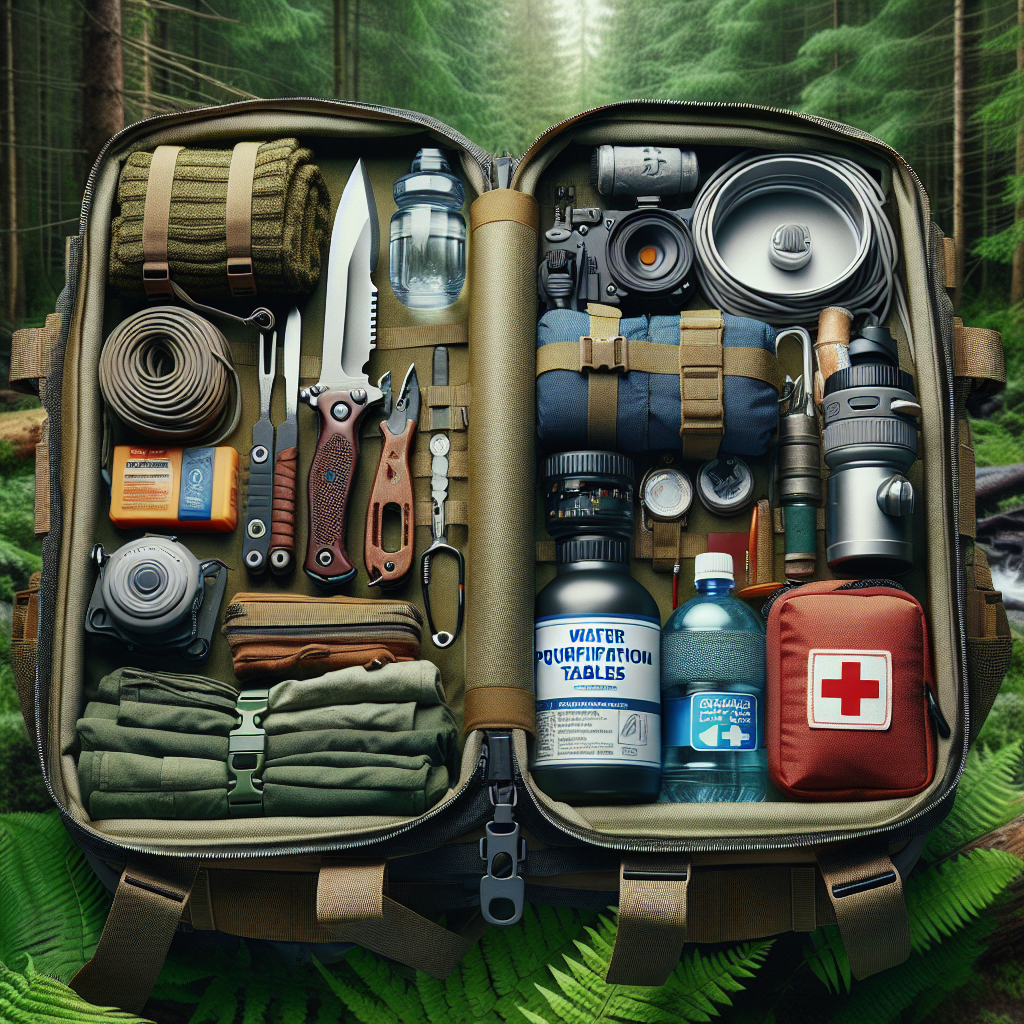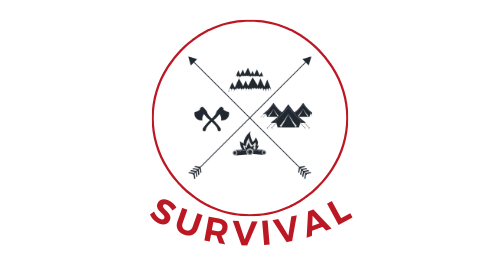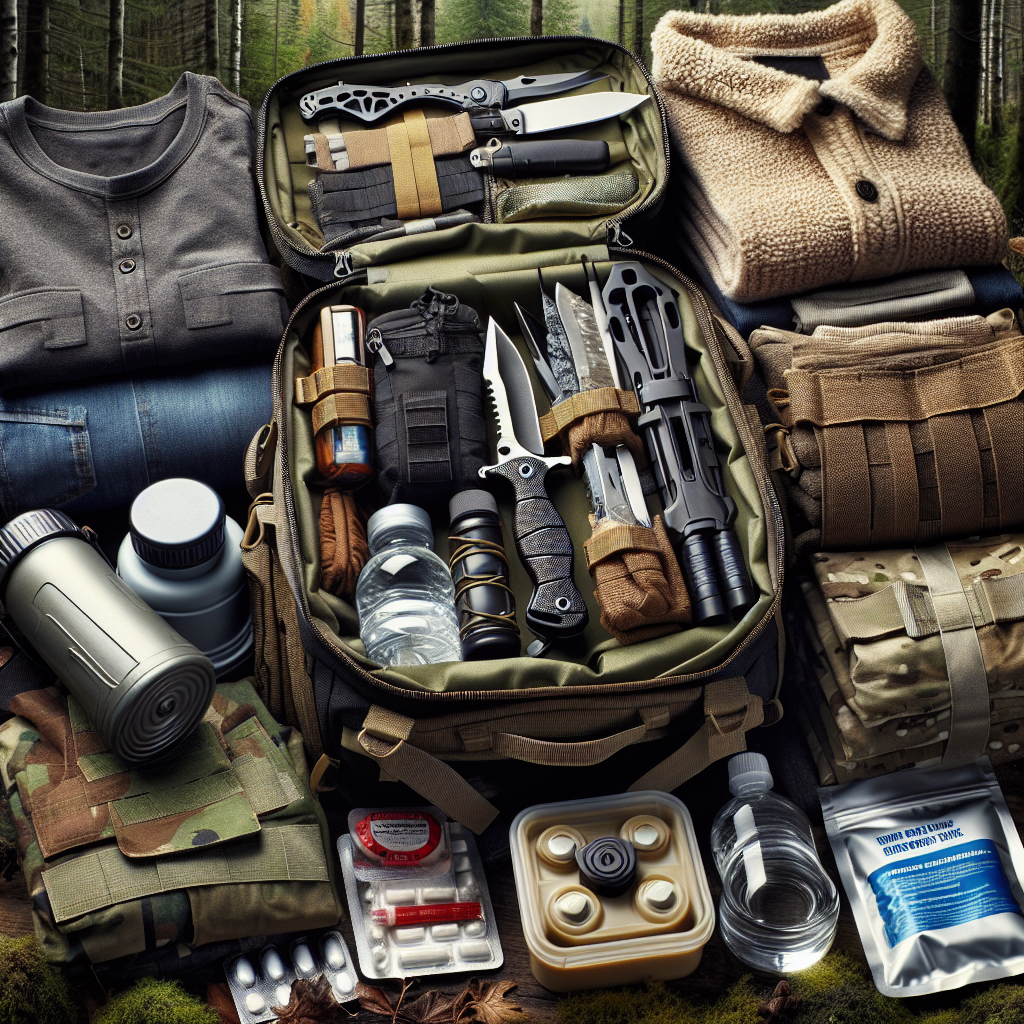Imagine embarking on an exciting outdoor adventure, whether it’s hiking through rugged terrains or camping in the wilderness. To ensure your safety and preparedness, a survival backpack becomes your trusted companion. Packed with essential tools and supplies, this article provides you with the ultimate checklist to guarantee that your survival backpack is well-stocked and ready for any unexpected situations that may arise. From food and water to protection and navigation, this comprehensive guide will equip you with everything you need to stay safe and secure during your thrilling escapades in the great outdoors. So, let’s get started on the journey to assembling your ultimate survival backpack!

Backpack
When it comes to choosing the perfect backpack for your survival adventure, there are a few factors to consider. The material of the backpack is crucial as it determines its durability and water resistance. Look for backpacks made of high-quality materials such as nylon or polyester, as they are both sturdy and water-resistant. Ensure that the backpack has multiple compartments and pockets, allowing you to organize and access your gear easily. Additionally, consider the size of the backpack. While you want it to be spacious enough to carry all your essentials, it shouldn’t be so large that it becomes cumbersome to carry. Finally, prioritize comfortability, as you’ll be carrying your backpack for long periods. Look for backpacks with padded shoulder straps and adjustable waist belts for optimal comfort.
Shelter and Sleeping
A reliable shelter is essential for survival in the wilderness. Your choice of tent will determine your comfort and protection from the elements. Look for a tent that is lightweight and easily portable, as this will make it more convenient to carry. Ensure that the tent is made of waterproof material and has a sturdy construction to withstand harsh weather conditions. To guarantee a good night’s sleep, invest in a high-quality sleeping bag that suits the climate you’ll be camping in. Different sleeping bags have different temperature ratings, so choose one that will keep you warm. A sleeping pad is also crucial to provide insulation and cushioning from the cold ground. Lastly, don’t forget to pack an emergency blanket in case of unexpected weather changes or emergencies.
Food and Water
Food and water are crucial for survival, and it’s important to pack enough to sustain yourself. Opt for non-perishable food items that are lightweight and easy to prepare. Canned goods, energy bars, and dehydrated meals are all great options. Remember to pack a can opener if needed and carry enough food for the duration of your adventure. In addition to food, carry an adequate supply of water. Invest in sturdy and reusable water bottles that are easy to carry and won’t leak. It’s also important to have a reliable water purification method such as water purification tablets or a portable water filter. This will ensure that you have access to clean and safe drinking water wherever you are.
Fire
Fire is not only a source of warmth but also essential for cooking food and purifying water. Make sure you have a reliable lighter or matches to start a fire easily. It’s always a good idea to carry a backup fire starter such as a magnesium fire starter or waterproof matches, as they can withstand wet conditions. Gathering firewood is crucial, so include a small saw or hatchet in your backpack for collecting firewood. If you prefer a more controlled cooking method, a portable camp stove is a great addition to your gear. These stoves are lightweight, compact, and easy to use, ensuring that you can cook your meals even in unfavorable weather conditions.

Tools and Equipment
Having the right tools and equipment can make a big difference in a survival situation. A reliable knife is a must-have item, as it can help with various tasks such as preparing food, building shelter, and cutting rope. A multi-tool is another essential item that combines multiple tools into one compact device. It often includes a knife, pliers, screwdrivers, and more. Don’t forget to pack duct tape, as it has countless uses in emergencies. It can be used to repair gear, secure shelter, or even make improvised bandages. Paracord is another versatile item that can be used for various purposes, from setting up a shelter to creating makeshift splints. Lastly, include a compass in your backpack to help you navigate and find your way in unfamiliar territory.
First Aid Kit
A well-stocked first aid kit is essential for any survival backpack. Include a variety of bandages of different sizes to treat cuts, blisters, or any other wounds. Antiseptic wipes or solutions are crucial to clean wounds and prevent infection. Painkillers such as ibuprofen or acetaminophen can help alleviate pain and discomfort. Tweezers are useful for removing splinters, ticks, or any other foreign objects. It’s also a good idea to include any necessary prescription medications if you have any specific medical conditions. Additionally, consider adding a basic first aid manual or guide to help you administer aid in case of emergencies.
Clothing
The right clothing can make a significant difference in your comfort and protection from the elements. The base layer is the first layer of clothing and should be moisture-wicking to keep your skin dry and comfortable. Look for materials such as merino wool or synthetic fabrics. The insulating layer should provide warmth and can include items such as fleece jackets or down-filled vests. The outer layer should be waterproof and windproof to protect you from rain, snow, and strong winds. Choose a jacket or pants made of durable and breathable material such as Gore-Tex. Don’t forget about your extremities – pack extra pairs of socks to keep your feet dry and prevent blisters. Lastly, a hat is essential to protect your head from the sun or to keep you warm in cold weather.
Navigation
In the wilderness, having the ability to navigate is crucial. A map of the area you’ll be exploring is essential to help you find your way and plan your route. Even if you have a GPS device, it’s important to have a physical map as a backup in case of technology failure. Speaking of GPS devices, they can be a valuable tool for navigation, especially in unfamiliar terrain. Ensure that your GPS device is fully charged and includes maps of the area you’ll be exploring. Additionally, a whistle is a vital signaling tool in case you get lost or need to attract attention. A signal mirror is also useful for reflecting sunlight and catching the attention of rescue teams in case of emergencies.
Communication
Staying connected with the outside world is crucial in a survival situation. Carry a fully charged cellphone in a waterproof case to communicate with emergency services if needed. It’s essential to have a backup communication method, such as a two-way radio, especially in areas with limited cell reception. A whistle is another effective tool for signaling help or alerting others of your presence. Ensure that you are familiar with the distress signals and Morse code, as they can be valuable communication methods when traditional means fail.
Miscellaneous
There are a few additional items that are essential to include in your survival backpack. Carry some cash in small denominations for emergencies or unexpected situations where digital payment may not be possible. It’s also crucial to carry identification, such as your driver’s license or passport, in case you need to prove your identity. Including emergency contact information is important. Write down the contact details of friends or family members who should be alerted in case of emergencies. Lastly, don’t forget to include some form of entertainment, such as a deck of cards or a book, to keep your spirits up during downtime.
By following this comprehensive checklist, you can ensure that your survival backpack is well-equipped for any unforeseen circumstances. Remember to regularly review and update your gear to ensure its functionality and durability. With the right tools and supplies, you’ll be ready to tackle any adventure that comes your way. Stay safe and enjoy your wilderness exploration!

